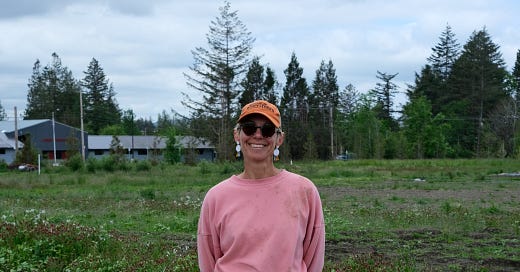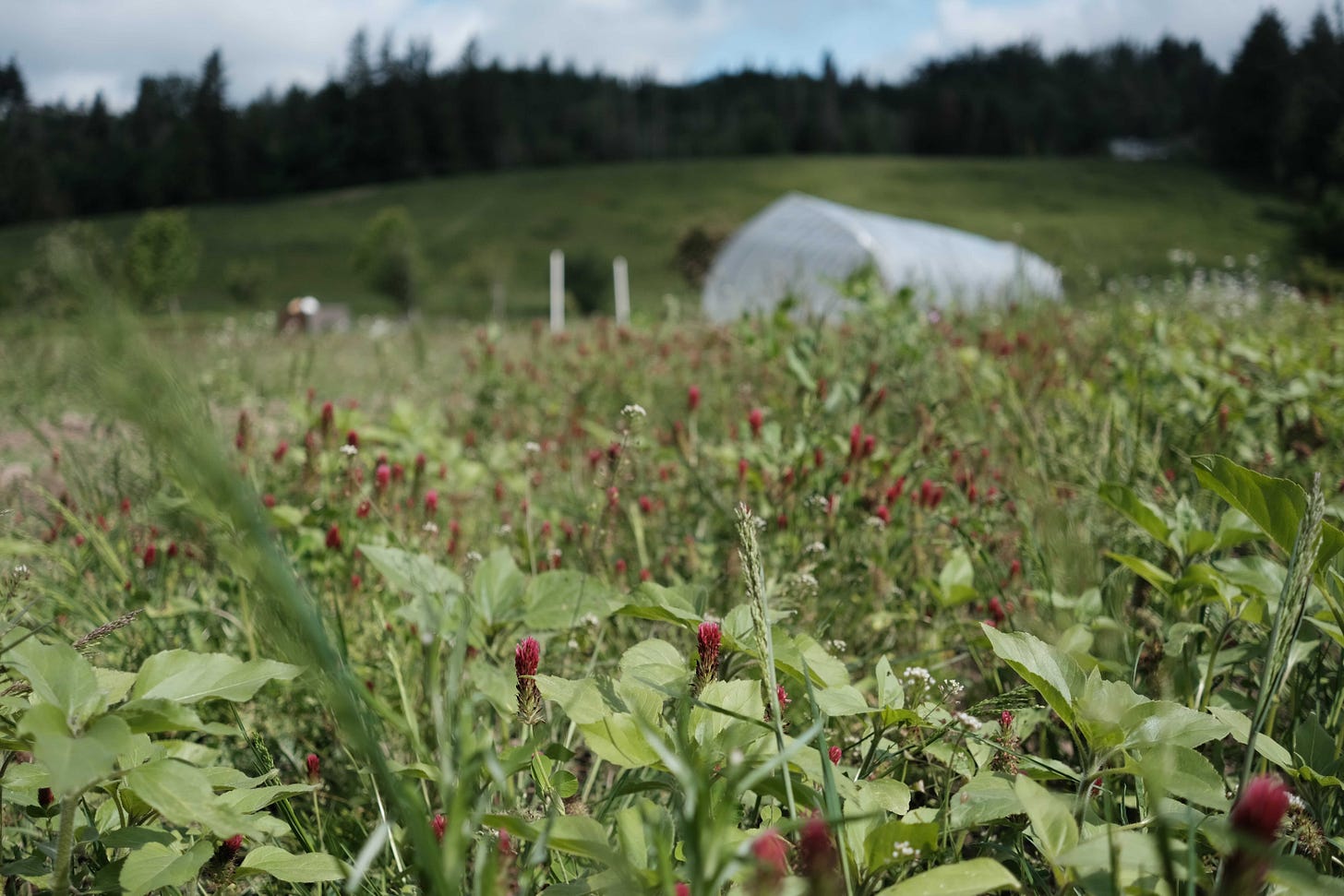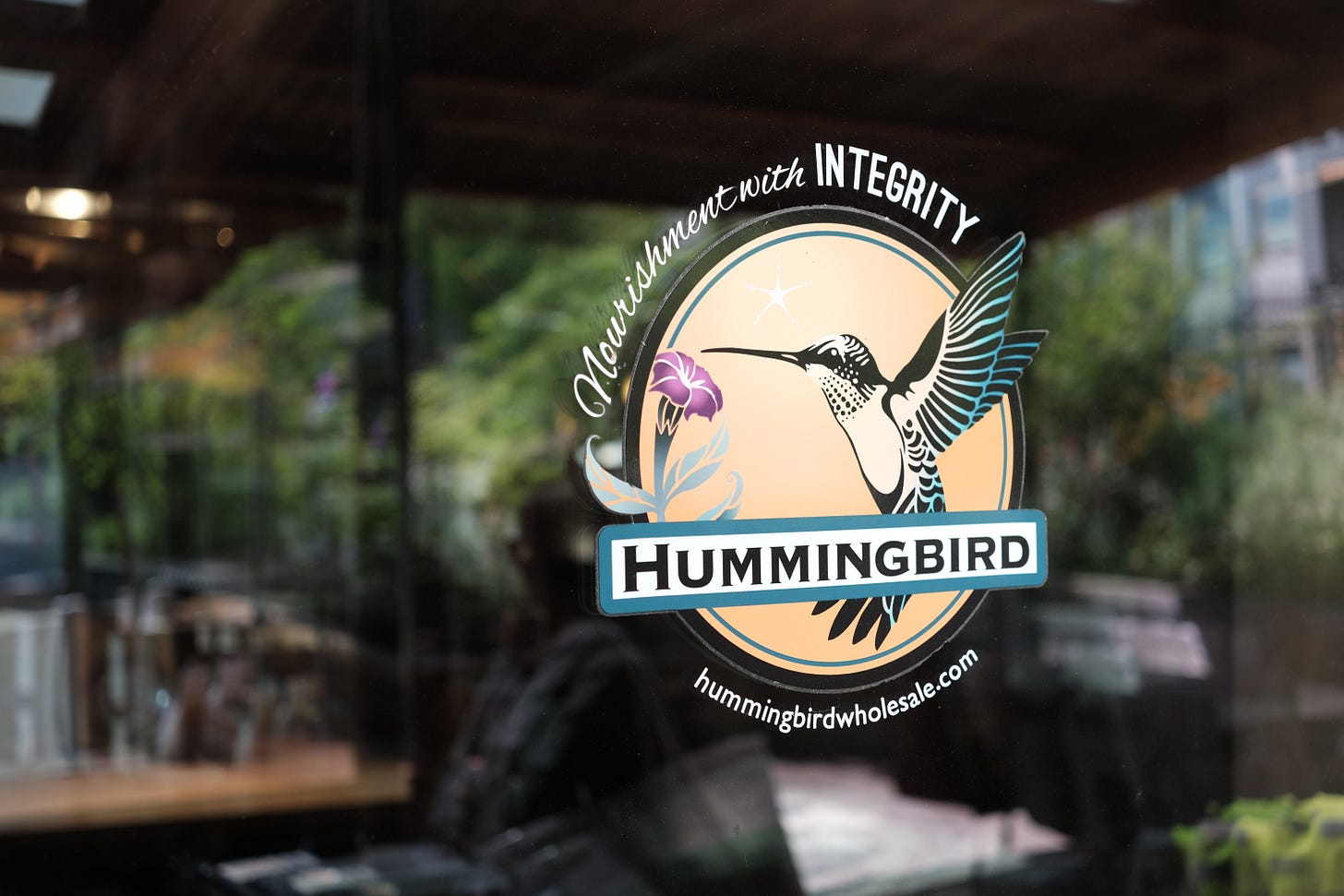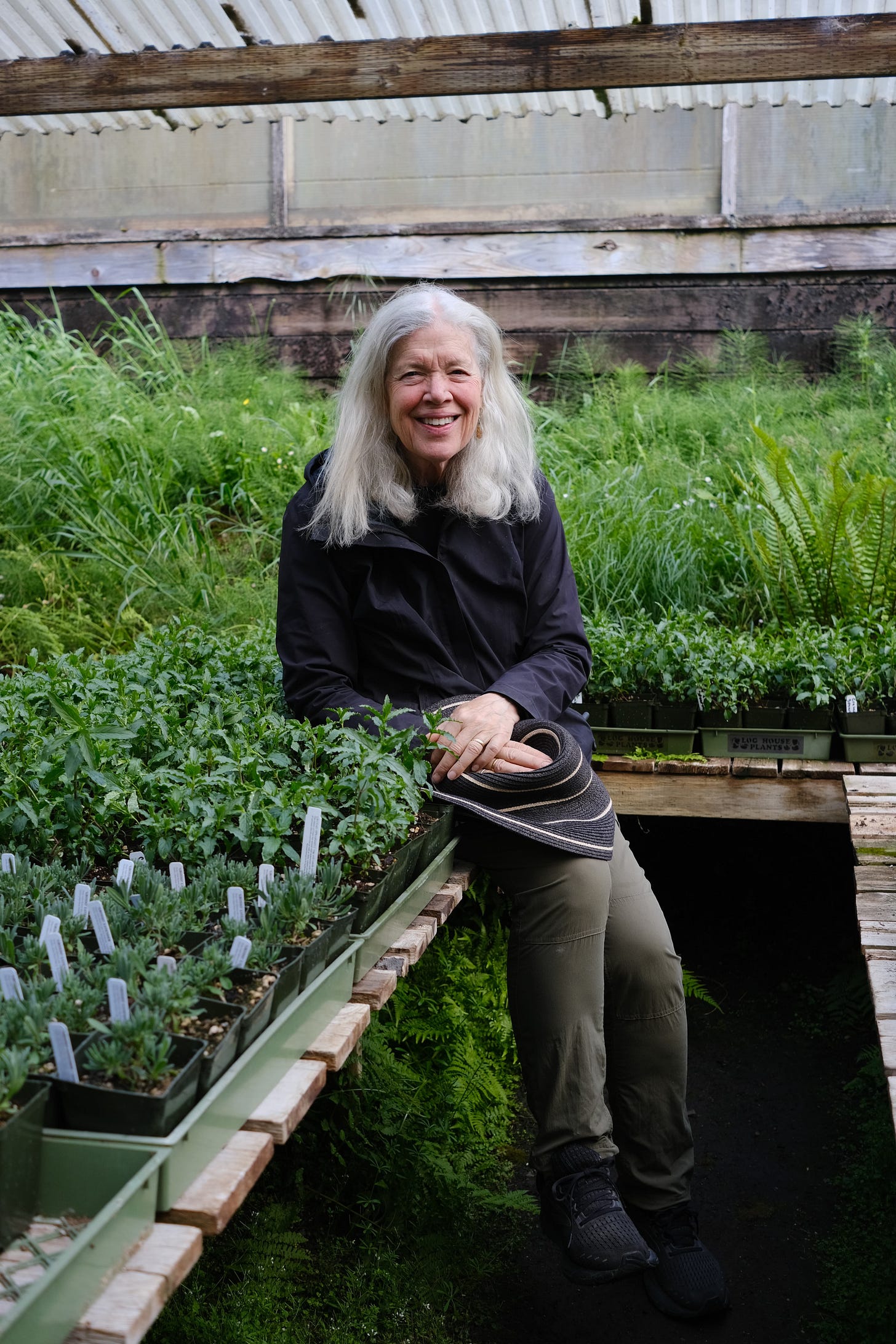During my time in Portland, I experienced a typical week in the life of the Culinary Breeding Network, accompanying Lane on visits, meetings and helping with the behind the scenes work of running the business. As well as getting a glimpse of the day to day goings on of CBN, Lane also organised some trips out to folks in the community so I could get a sense of the wider network that she is connected with.
Our first stop was with Mary Colombo at Wild Roots Farm in Corbett, just 20 miles east of the city. Wild Roots Farm is located near the confluence of the Sandy and Columbia rivers on the ancestral lands of the Chinookian people. Mary and the Wild Roots Crew grow over 200+ varieties of quality vegetables and herbs on site, largely for their CSA but also for local restaurants – and all for the Portland metro area.
Mary is passionate about growing good food for local people. She grows a diversity of crops, and ‘finds joy in inspiring somebody to try something new’, whether that be a new variety of tomato or a totally new crop. She collaborates with Lane in variety trials and regularly participates in the CBN events. The first farmer I’d met on my trip, I was eager to discuss seed with Mary. Although not a seed grower herself, she clearly has an interest in having access to a wide range of varieties and has also felt the impact of the dramatic variations in climate on certain crops in recent years.
Both Open Pollinated (OP) crops and F1 hybrids are grown at Wild Roots Farm, Mary purposefully choosing F1s when she needs reliability uniformity – for example in staple crops that ‘pay the bills’, like carrots. But she likes to use OPs where she can, and when she knows they will perform well. She feels like ‘more attention has gone into organic OP breeding over recent years’ (arguably a direct result of schemes such as NOVIC and the work of CBN), and when the flavour and adaptability to this specific region is there, she is willing to compromise on uniformity/yield. Oregon is one of the country’s major seed production areas, and Mary recognises the benefits this brings. Uprising Seed in Bellingham, WA, is just one of the many local seed companies Mary buys from. ‘I definitely feel like impact of climate is something we’ve observed, wild swings in climate, hot summers, wet springs and harsh winters have impacted what does and doesn’t survive. So yeah, when I read in the Uprising Seeds catalogue that one of their crops performs really well in our wet spring but also in a really dry hot spring here, then yes (I’m interested in that crop), this crop has been bred here and has been going through this cycle of change very close to what’s happening at our location. I know it will produce better because it’s been bred and grown out for this region.’
Beyond the field, we also visited Oregon State University Department of Horticulture, where Jim Myers and his team develop and improve vegetable varieties specifically to support gardeners and farmers like Mary, in the Pacific Northwest region. Jim was out of town the day we visited, but his colleague, Josh, showed us around the facility. As well as working with conventional crops, a focus at OSU is to increase the availability of organically produced vegetable seed by identifying and breeding varieties specifically adapted to organic systems.
When we visited, there were some Indigo tomato trials in progress – backcrossing Jim’s Midnight Roma variety with a wild tomato with the aim of offering a natural alternative to a recently released genetically modified (GMO) Purple Tomato line. The deep indigo colour of Jim’s variety brings with it those flavonoids - the all-important phytochemical compounds that offer countless health benefits to the consumer. By backcrossing with wild genes, they hope to bring more resilience in terms of disease resistance and vigour to any new strains that arise. These are traditional methods of breeding, that have existed for centuries and involve no lab based altering of DNA with unknown consequences. It’s reassuring to see this organic focused plant breeding in action at OSU, and to know that there are still people on the front line demonstrating viable alternatives to genetic engineering.
The tomatoes were just one of the many exciting trials the OSU hort team are conducting, both in lab but also in the field. But the unique piece of this story is at OSU they don’t do this in isolation. The Culinary Breeding Network have been integral in connecting the plant breeders with the wider food network so that their work is significantly relevant to farmer and consumer demand. It reinforces, yet again, the value of connection and forging these cross-sector relationships.
As the week goes on, I am beginning to understand how all of these threads weave together to form, what appears to an outsider, as a resilient and thriving organic food network centred around seed. South of Portland in the city of Eugene, is Hummingbird Wholesale, an independently owned bulk food and ingredient wholesaler. Stacy Kraker, Director of Sales, Marketing and Sourcing gave us a tour of their facility. Hummingbird primarily work with regional farmers who are dedicated to organic practices. They offer organic high quality and nutritious food grown as locally and sustainably as possible. Their delivery route is within Oregon and Washington State, essentially up and down the I5 freeway, distributing grains, beans nuts, dried fruits and other whole foods.
The business is in its 4th decade, and in the process of transitioning to an Employee Owned Purpose Trust. At the core of their values lies community – Hummingbird work with farmers to overcome the countless challenges they face, sharing the risk, for example sourcing a guaranteed market for crops before seed is even in the ground, and fronting cost for seed for farmers. The journey hasn’t always been smooth, and there has been some compromise along the way. They’ve had to negotiate the tension between being innovative, and scaling up, which means sometimes lines have to be dropped, or ways of working adapted to make more economic sense. But the overall sense is one of abundance and respect, for both the earth, its resources and also the people.
Final stop on our travels outside of the city was Log House Plants in Cottage Grove. Alice Doyle and her family have been growing edible and ornamental plants that thrive in the PNW at this beautiful nursery, nestled in the hills surrounding Dorena Lake, for nearly 50 years. Alice has a long-standing commitment to earth stewardship and sustainable gardening. Although not certified organic, the team lean towards IPM and biological controls, and have a deep respect for their surroundings. The nursery itself feels alive - wooden benches slowly being engulfed by banks of ferns, row upon row of carefully tended for plants thriving against the backdrop of Cedars and Douglas Fir.
Alice clearly loves what she does and was eager to share her special ‘projects’ with us. Every year the team take on an exciting new horticultural project, from ‘Super Dwarf Tomatoes’, to the ‘Butterfly Bed and Breakfast’ project. There are decades of innovative horticultural delights in the archives. The Culinary Breeding Network collab is one of these projects, a collection of some of CBN’s favourite plant varieties to both grow and eat. All of the varieties have been selected for their flavour, beauty and performace in the garden, including some of the Gusto Italiano project and other standout favourites in the Chef’s collection. They all receive the iconic CBN branding, with links to each variety’s background story, encouraging the customer to engage in much more than just purchasing a plant. It’s just another unique way Lane and CBN extend the impact of the work they do far beyond the farm gate.
Within Portland, we also spent time with many other people connected to the Culinary Breeding Network. A highlight was meeting Nikki Guerrero, owner of Hot Mama Salsa. Nikki gave us a tour of their new facility, and revealed the processes that go into producing all of her delicious Mexican style chilli oils and tortilla chips. Crafted by hand, Hot Mama Salsa source their speciality dried chillies from Mexico, but Nikki also works with local farmers who supply her with peppers and chillies that grow more happily in the region. Lane reached out to Nikki during the NOVIC trials, determined that end users of the chillies and peppers should be involved in tasting and trialling the varieties as part of the breeding process. Since then, Nikki has worked with Lane at many of the local CBN events, and her hot sauces can be found on the shelves of most local retailers.
Reflecting on my time in Portland, it’s become clear of the exponential power of connection. The pressures of working within our current agricultural and food systems are very real, and there is often a necessity for us to focus on the task in hand just to make ends meet – to just get the job done. However, when the time and the space is made to step out of that daily routine, to meet other stakeholders in our networks and engage in conversation and exchange ideas, that’s where the magic can happen, and real community and resilience can start to emerge…












